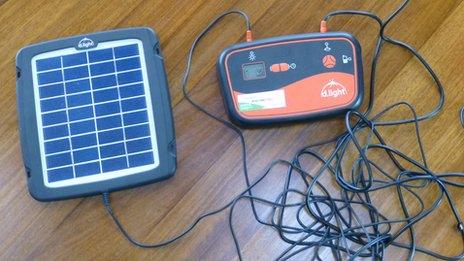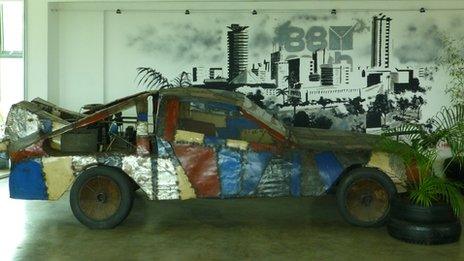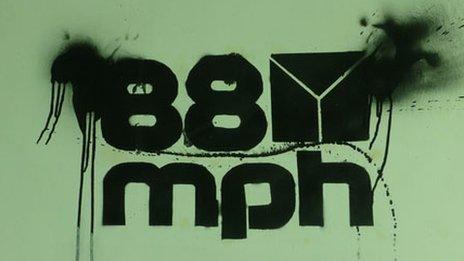Jambo tech! (Hello, tech! in Swahili)
- Published

The M-Kopa lamp is one of numerous innovations coming out of Kenya
Kenya is making an international name for itself as a technology centre. They call it, in the manner of these things, Silicon Savannah.
As I explained in my previous blog from the country, first came the mobile phone, bringing connectivity to vast numbers of people who were never connected before.
Then came mobile money, empowered by the phone. And now the pace is quickening.
IBM and Google have set up regional centres in Nairobi, promoting innovation and research as well as selling. Google's chairman Eric Schmidt spoke highly of Kenya's tech prowess during a recent visit.
There are several tech hubs and accelerators in Nairobi. At one called 88mph, the other afternoon, I met a succession of start-up businesses trying to create new companies out of that convergent potential of mobile phones, and the mobile money launched by the Kenyan phone company Safaricom six years ago.
Tech-savvy
People say that just as many developing world countries skipped the copper-wire stage of telephony and jumped straight to mobile phones, so Kenya (in particular) skipped the desktop computer and laptop era of computing.
Now very clever young people are leaping into business with new ideas about how to use these new mobile platforms.
Although many Kenyans have rushed to get mobile phones, most cannot yet afford smartphones. So applications using all those Africa phones have of necessity to be simple, probably text-based ones.
As we know from other tech-savvy places, constraints like that are actually inspiring - not limiting - for ingenious young entrepreneurs.
What is very striking about Kenya is the number of returnees - and adventurers from overseas - who are starting businesses, endorsing the country's reputation by putting their money and energy into where Kenya's mouth is.

Technology hub 88mph got its inspiration from the DeLorean time travelling car in the hit Back to the Future movie series
It is a signal moment when people educated abroad think - with their global perspective - that home is where the grass of opportunity is greenest.
The vertical takeoff of mobile telephony has started non-government organisations and entrepreneurs thinking about the grassroots possibilities of using all those phones.
And the rapid acceptance of mobile money has started deep thinking about what can be done in connection with it - addressing many of what the late Prof CK Prahalad called the Bottom of the Pyramid, the poor.
And the Kenyan government seems to have lost many of its inhibitions about letting daylight into how it works and the decisions it takes.
Funeral financing
One of the moving spirits behind the digitisation of Kenya is a local techno-enthusiast called Bitange Ndemo, who has just left the Ministry for Information and Communications after eight years as chief civil servant.
He's been a bold champion of using the internet to create transparent government, believing that information transforms societies and brings prosperity in its wake.
He says Kenya has used the internet to open up government to the people, and the people are responding to it.
The result of all this is an extraordinary flourish of new businesses or almost-new business, often no more than a few people with laptop computers gathered together in buzzy tech hubs. They are very like the places in Berlin or New York or San Francisco, or Silicon Roundabout in the East End of London.
But there seems to be a difference - many of these prospective businesses are being built from ground-level African needs, not around consumer fads or fashions like so many of those in Europe or the USA.
The 88mph hub is named after the speed it takes that famous DeLorean to get Back to the Future in the film of the same name. One start-up I ran into there is M-Changi. Changi means collect. It's a rather tragic application addressing a real need in Africa - the financing of funerals, many of them victims of Aids.
M-Changi enables friends of family of the deceased to make mobile payments into an easily created fund for the funeral or (more cheerfully) the wedding or any other social event. You can use it to fundraise for anything of course, and people are doing so.
A few steps further on across the open floor of the hub, there's M-Kazi (it means job). It's a recruitment platform that works not on the internet (which many Kenyans have little access to) but simply, on a mobile phone.
Next door is another start-up writing the software to organise mobile phone payments for Kenya's many rental property companies.
That is just a sample of the new businesses developing in one Nairobi hub.
Cheaper alternative
Meanwhile the company that started the mobile-payments revolution, Safaricom, is itself busy getting involved in more projects related to phones and mobile money to help Africa and (naturally) drive mobile use.
Safaricom's current chief executive is a genial Guyanan, Bob Collymore. He told me about a new service launched in connection with a local bank to enable phone users to save tiny amounts of money, regularly. Micro-saving is a significant extension of the now familiar micro-lending. Why shouldn't the poor be able to save like the rich?

The 88mph hub is home to a number of Kenyan start-ups
He also showed me a solar-powered lamp for the 80% of homes in Kenya without power. It's activated by daily mobile money transfers - and switched off by the company when the money is not paid.
The M-Kopa lamp comes from a company co-founded by Nick Hughes, the man who helped invent mobile-phone-based money transfer service M-Pesa for Vodaphone. It is cheaper than the kerosene-fuelled alternative, says Bob Collymore.
The buyer makes daily mobile money transfers, which are micro payments for the lamp, and they can become credits or savings when the system is paid for over a year or so.
M-Kopa is thinking of using its technology to organise payments for fridges, or irrigation, and in many developing countries where regulators allow it. Other companies will be setting up similar systems soon.
Kenya seems to be erupting with ideas about how to use technology to address the problems of places without money or resources, and some of them are going to be turned into businesses that may become of international size and significance.
Africa shows technology in a different light from the way it has so far evolved in rich places. I think that Western entrepreneurs may soon have quite a lot to learn from their counterparts in places such as Kenya.